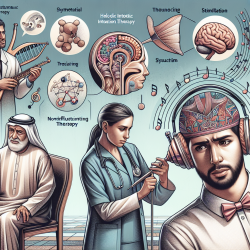As practitioners in the field of speech pathology, we continuously seek effective methods to treat aphasia, particularly in nonfluent adult patients. The complexity of aphasia demands a nuanced approach, considering both the linguistic and motoric aspects of the condition. A pivotal research article, "Organizing Treatment Programs for Nonfluent Adult Aphasic Patients," provides valuable insights into structuring treatment programs that can significantly enhance our practice and patient outcomes.
The article underscores the importance of addressing the dual challenges in nonfluent aphasia: the syntactic and morphosyntactic deficits and the co-occurring apraxia of speech. It introduces two critical techniques: Helodic Intonation Therapy (HIT) and Syntax Stimulation Program (SSP), which, when combined, offer a comprehensive approach to treatment.
- Helodic Intonation Therapy (HIT): This technique leverages the musical elements of speech (melody and rhythm) to facilitate verbal expression in patients. HIT is particularly effective in overcoming the nonfluency aspect by enhancing motoric and linguistic reorganization, thus aiding in the retrieval of specific syntactical structures.
- Syntax Stimulation Program (SSP): Paired with HIT, SSP focuses on the retrieval of syntax among patients. Once a patient has sufficiently reorganized their motor system to repeat models, SSP is employed without the support of HIT. This approach is instrumental in addressing the language impairment aspect of aphasia.
The research also highlights the role of group-pragmatic based therapy and morphosynthetic comprehension training, emphasizing the importance of a multimodal approach in aphasia treatment. Such an approach not only addresses the linguistic deficits but also fosters social skills and communication strategies within a supportive group setting.
Implementing these strategies requires a detailed understanding of each patient's unique challenges and strengths. The article suggests a rigorous adherence to these therapeutic techniques, ensuring that patients receive a tailored, intensive treatment plan that spans individual and group therapy sessions.
Moreover, the involvement of family and caregivers in the therapeutic process is crucial. Educating them about aphasia and effective communication strategies can significantly impact the patient's recovery and quality of life. The research advocates for a holistic approach that encompasses the psychosocial aspects of aphasia, aiming for a comprehensive rehabilitation process.
Incorporating the insights from this research into our practice can lead to more effective treatment outcomes for nonfluent adult aphasic patients. It encourages us to adopt a multifaceted treatment model that addresses the complex interplay of linguistic, motoric, and social elements in aphasia. By doing so, we can offer our patients a pathway to improved communication abilities and a better quality of life.
To further explore these innovative treatment strategies and their application in clinical settings, I highly recommend reading the original research paper. To read the original research paper, please follow this link: Organizing Treatment Programs for Nonfluent Adult Aphasic Patients.










